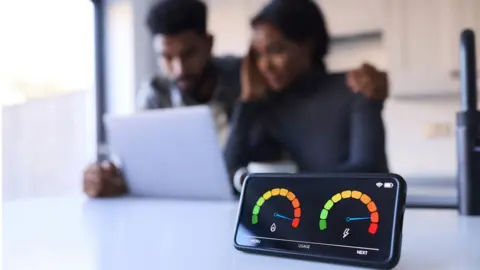Prepayment fears delaying smart meter roll-out, warn MPs
 Getty Images
Getty ImagesCustomers' fears that they could be forcibly switched on to prepayment energy meters may be putting people off getting smart meters, MPs have warned.
Last winter smart meters were used to switch some households remotely on to prepayment meters, leaving them at risk of running out of power.
That is one reason smart meter roll-out remains "too slow", the Public Accounts Committee (PAC) said.
All homes were supposed to have been moved on to smart meters by now.
Smart meters measure how much gas and electricity you use and can send those readings via a remote connection to your energy supplier.
The government says they are crucial to making homes more energy-efficient and cutting carbon emissions.
In 2008, the then Labour government said that all homes should have one installed by 2019, but that deadline has been repeatedly pushed back.
As of March this year only 57% of meters (32.4 million) were smart. Ministers hope to increase this to 75% by 2025.
The vision of every home having one remained "distant", the PAC said, as not enough was being done to convince the public of the benefits.
The committee said consumers with traditional meters were "less interested" in having a smart one installed, and reports of bad practice among suppliers had put people off.
A spokesperson for the Department for Energy Security and Net Zero said a recent public spending report by the National Audit Office had recognised the "progress made on the roll-out of smart meters, acknowledging savings would be worth around £50 a year off a typical dual fuel bill".
"Suppliers have been set ambitious but realistic installation targets so as many people benefit as quickly as possible," the spokesperson added.
Last year, energy regulator Ofgem warned that a rising number of households were having their smart meters remotely switched to prepayment meters, sometimes without warning.
Suppliers can put customers on prepayment meters if they struggle to keep up with bills, arguing it helps them to manage their energy use. But Citizens Advice has called it "disconnection by the backdoor", as people may not have the money to top up and may run out of power.
The committee also found that energy suppliers, under pressure from government-imposed targets to install more, could put pressure on customers to accept a smart meter, leaving some people feeling threatened.
"Smart meters have serious reputational obstacles to overcome with the public," PAC chair Dame Meg Hillier said.
"In particular, our inquiry has found that consumers' enthusiasm for adopting one has been understandably harmed by recent shocking reports of forced installations."
The PAC said that as of March this year, around three million smart meters were not working properly and components for an estimated seven million would soon need to be replaced when the 2G and 3G mobile communications networks were switched off.
The government also needed to update its evidence on the efficacy of smart meters, so that consumers can fully understand the benefits, it said.
Its most recent estimates of consumer energy savings were based on data from installations that took place between 2015 and 2018, the committee found.
"The evidence is unclear whether their benefits are even working as advertised," said Ms Hillier.
